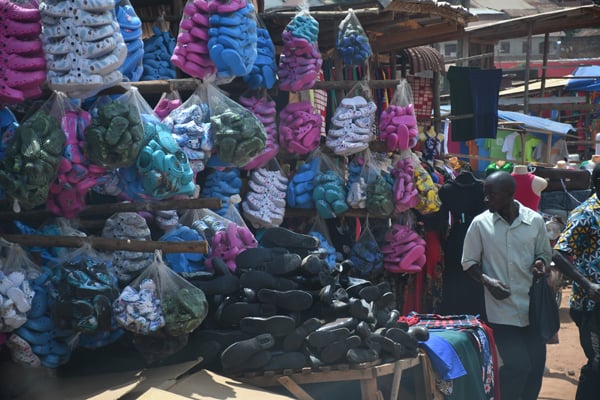Prime
Maize, milk export earnings increase

Agriculture Minister Frank Tumwebaze (right) talks to State Minister for Animal Industry Bright Kanyontore Rwamirama during the release of the report in Kampala on March 27, 2024. PHOTO/ ISAAC KASAMANI.
What you need to know:
- Leading among the commodities were coffee, dairy products, fish and its products, maize and cocoa beans as the top five contributors.
Government has reported an 18 percent annual growth in exports of agricultural commodities, from $2.085 billion (Shs8.1 trillion) in the 2021/2022 financial year to $2.453 billion (Shs9.5 trillion) in the 2022/2023 financial year.
Leading among the commodities were coffee, dairy products, fish and its products, maize and cocoa beans as the top five contributors. This information is contained in the agro-industrialisation programme annual performance report for the 2022/2023 financial year, which was released by the Agriculture ministry in Kampala yesterday.
The report indicates that as a result of the above increase, “the share of agricultural exports to total exports” also increased “from 33 percent in the 2021/2022 financial year to 41.8 percent in the 2022/2023 financial year”.
“Relatedly, the export value of priority commodities (coffee, tea, fish, dairy, maize and meat), grew by 23 percent, from $1.257 billion in the 2021/2022 financial year to $1.547 billion in 2022/2023 financial year,” the report further reads.
But this is still below the target set in the National Development Plan III, to increase the export value of priority commodities from $0.935 billion (Shs3.6 trillion) in the 2017/2018 financial year to $2.7 billion (Shs10.4 trillion) in the 2024/2025 financial year.
The Agriculture ministry attributed the increase to the government’s efforts to improve product quality and standards and sustain production.
“To develop external and domestic product markets, the government negotiated five coffee markets (China, United Kingdom, United Arab Emirates, United States of America and Italy) and formal dairy export destinations increased by eight countries, including Zambia, Rwanda and Algeria,” the report reads.
“Kenya also agreed to no tariff barriers of milk and poultry products from Uganda. Government also promoted 119 coffee brands. Government promoted domestic coffee consumption through 33 events in 16 districts, carried out 450 radio adverts and 17 talk shows,” the report reads further.
The government has recently been under public pressure to explain transparency and accountability issues around deals in coffee export and billions of shillings spent on promoting local consumption of coffee.
In February 2022, Finance Minister Matia Kasaija, on behalf of the government, signed an agreement with Enrica Pinetti, an Italian investor to construct an $80 million coffee processing factory in Uganda. Pinetti signed on behalf of Uganda Vinci Coffee Company Limited. The agreement, politicians and farmers said, would grants Vinci a monopoly to export Uganda’s coffee.
This agreement drew strong opposition from a section of Ugandans, especially those involved in the coffee value chain, saying it was bad for Ugandan farmers. Parliament, in response, passed a resolution urging the government to walk away from the agreement because it was disadvantaging Uganda as it granted Vinci a monopoly to export Uganda’s coffee.
However, the Agriculture ministry, in the report, stated that “Overtime, these promotional events and advertisements have increased domestic coffee consumption to 350,000 (60kg) bags in the 2022/2023 financial year from 244,800 bags in the 2017/2018 financial year”.
“Coffee exports also remained as the leading, constituting 36.8 percent of the agriculture exports followed by dairy and its products (13.2 percent), maize (7.45 percent), fish and its products (6.3 percent) and sugar (five percent). The five commodities altogether constituted 68.7 percent of the total agricultural exports,” the report reads further.
However, the same report also shows that there is a decline in the volume of coffee production from 8.45 million (60kg bags) in 2021/2022 financial year to 7.8 million (6okg bags) in 2022/2023 financial year. It is unclear whether the above issues could have contributed.
Maj Gen (Rtd) David Kasura Kyomukama, the Permanent Secretary in the Ministry of Agriculture, said the country, which majorly practices rain-fed agriculture, is facing challenges of erratic climate, pests and diseases which affect production.
“In order to have agro-industrialisation, you need raw materials and to get this, we need a stable agricultural system. But our system is threatened critically by climate change and weather variability,” he said.
“At some point, you have a lot of product because you have very good weather but in another season, you have very little product because the crop has failed,” he added.
The Agriculture minister, Mr Frank Tumwebaze, called for close collaboration among relevant ministries like water and environment, trade, and local governments to address gaps that hinder progress in agriculture, a sector that employs the majority of Uganda.
“The Ministry of Water can’t work alone, [that of] Agriculture can’t work alone, we all need to work together for the common good of the people. If they say our tea sector is collapsing because people are harvesting wrongly, we shall be condemned as the Agriculture [ministry] but we are not alone,” he said.
Most improved, declined commodities
According to the report, in terms of quantities, dairy products, maize, groundnuts, fruits and vegetables, beans, and tobacco exports increased in the 2022/2023 financial year as compared to the 2021/2022 financial year. The export of coffee, fish and its products, cocoa beans edible fats and oils, cotton, flowers and rice declined in the 2022/2023 financial year as compared to the 2021/2022 financial year.
Recently, the government has been discouraging the production of rice in wetlands. Many rice farmers prefer growing rice in wetlands, partly because of unpredictable rainfall patterns that would frustrate upland rice production.




